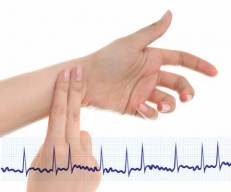Atrial Fibrillation Brings Stroke Risk – A Test You Can Do
Atrial fibrillation is a major risk factor for stroke, making a person 5 times more likely to suffer stroke.
WHAT IS IT? Atrial Fibrillation is a type of irregular heartbeat. It is caused when the two upper chambers of the heart (atria) beat rapidly and unpredictably, producing a changeable heartbeat.
With Afib, blood pools in the heart, where it tends to form clots that can then be carried to the brain, triggering a stroke. Left untreated over the long-term, Afib can weaken the cardiac organ, leading to heart failure.
Stroke is the nation’s number four killer. Afib is present in about one out of five strokes.
Most Americans over age 40 are “at risk” for Atrial Fibrillation. More than 70% of Afib patients who have strokes will die.
DIAGNOSIS.
“People diagnosed with Afib have already taken the first step to preventing an Atrial Fibrillation-related stroke,” says McLeod Interventional Cardiologist Dr. Anil Om. “Unfortunately many Americans who have this heart irregularity do not know that they have it.”
Common Atrial Fibrillation Symptoms include:
- Heart palpitations.
- A sudden pounding, fluttering or racing sensation in the chest, sometimes referred to as “butterflies”.
- Dizziness or feeling light-headed.
The National Stroke Association suggests a simple “Check Your Pulse” test once every month to check for an irregular rhythm – a sign of possible AF. Remember, you are looking for heart rhythm, not the number of beatsduring your self-check.
“Check Your Pulse” Test
1. Turn your left hand so the palm is facing up. Place the first 2 fingers of your right hand on the outer edge of your left wrist, just below where your wrist and thumb meet.
2. Slide your fingers toward the center of your wrist until you find your pulse.
3. Press your fingers down onto your wrist until you feel your pulse, being careful not to press too hard. Move your fingers around until the pulse is easy to feel.
4. Feel your pulse for one minute. Do not count the beats. Just pay attention to whether the rhythm seems regular or irregular (erratic, unpredictable).
If you suspect you may have an irregular pulse, you have difficulty locating your pulse or performing the screening technique, discuss your concerns with your physician.
TREATING AFIB.
Atrial Fibrillation treatment can greatly lower your chances of stroke. Through lifestyle changes, medication or electrical stimulation, it’s possible to restore the normal heart rhythm and beat the odds of having a stroke.
Start with these lifestyle changes.
- Don’t smoke.
- Incorporate regular physical activity into your schedule.
- Maintain a healthy weight.
- Eat a healthy diet that is high in fruits, vegetables, and whole grains, including low-fat dairy products. Limit salt, saturated fat and cholesterol in your diet.
- Monitor your blood pressure and work to keep it at your goal.
- Take your medication as prescribed if you have high blood pressure or atrial fibrillation.
- Limit alcohol to no more than two drinks a day for men or one drink for women.
FINAL THOUGHT.
Although some 2.2 million Americans have diagnosed Afib, about one-third of Americans who suffer these irregular heartbeats are still undiagnosed.
Don’t hesitate to see your personal physician and discuss your concerns about an irregular pulse.
Sources: McLeod Health, American Heart Association, National Stroke Foundation
-
McLEOD REGIONAL MEDICAL CENTER FLORENCE
843-777-2000 -
McLEOD DARLINGTON
843-777-1100 -
McLEOD DILLON
843-774-4111 -
McLEOD LORIS
843-716-7000 -
McLEOD SEACOAST
843-390-8100 -
McLEOD CHERAW
843-537-7881 -
McLEOD CLARENDON
803-433-3000



-
McLEOD REGIONAL MEDICAL CENTER FLORENCE
843-777-2000 -
McLEOD DARLINGTON
843-777-1100 -
McLEOD DILLON
843-774-4111 -
McLEOD LORIS
843-716-7000 -
McLEOD SEACOAST
843-390-8100 -
McLEOD CHERAW
843-537-7881 -
McLEOD CLARENDON
803-433-3000
 Find a Doctor
Find a Doctor  Locations
Locations  Services
Services 